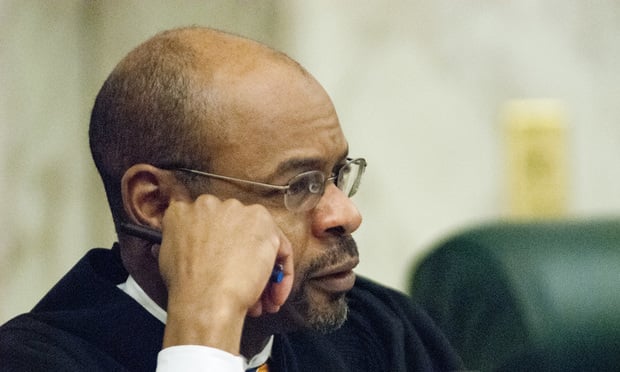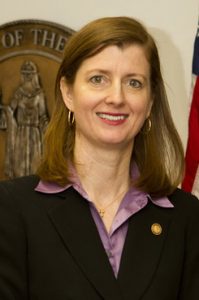 Justice Harold Melton. (Photo: John Disney/ALM)
Justice Harold Melton. (Photo: John Disney/ALM)
Defense attorneys are cheering two recent appellate decisions limiting the state’s ability to use third-party evidence or testimony against criminal defendants.
On Oct. 30, a unanimous Georgia Supreme Court declared unconstitutional a portion of Georgia’s gang statute that allowed the state to introduce into evidence the criminal convictions of nonparties who are not witnesses in the instant case.
The next day, the Georgia Court of Appeals turned down prosecutors’ efforts to use statements made to doctors by the mother of a child molestation victim identifying the man accused of the abuse, after both mother and child left the country.
The judges in that case ruled that allowing such testimony did not fall within Georgia’s “child hearsay statute” exception, turning aside prosecutors’ arguments that a 2013 revision to the state’s evidentiary rule made the testimony admissible.
The Supreme Court case involved five men charged with a variety of crimes in DeKalb County including attempted murder, aggravated battery, kidnappings and violation of the Georgia Street Gang Terrorism and Prevention Act.
Prosecutors notified the trial court that they intended to introduce into evidence four prior convictions of gang members, three of which were obtained against nondefendants.
As detailed in the order crafted by Justice Harold Melton, the defendants filed a joint motion seeking to have the section of the gang statute allowing such evidence declared unconstitutional.
The act lists a number of offenses that can be prosecuted as gang activity. The relevant segment of the statute, O.C.G.A 16-15-9, states: “For the purpose of proving the existence of criminal gang activity, the commission, adjudication, or conviction of any offense enumerated [in the statute] by any member or associate of a criminal street gang shall be admissible in any trial or proceeding.”
In September 2016, DeKalb County Superior Court Judge Clarence Seeliger ruled the introduction of such evidence would violate the defendants’ Sixth Amendment rights to confront their accusers.
In upholding Seeliger’s ruling, Melton said the statute’s provision flew directly in the face of the U.S. Supreme Court’s 1899 ruling in Kirby v. United States, 174 U.S. 47. In that case, prosecutors attempted to use a federal statute allowing the convictions of someone for stealing government property to be used against a defendant accused of receiving that property.
The Georgia statute “does exactly what the United States Supreme Court declared was constitutionally forbidden in Kirby,” Melton wrote.
“Additionally,” he wrote, “the third party convictions are used to prove facts underlying the crimes charged against entirely different defendants” to prove their alleged involvement in gang activity.
In a footnote, Melton also dismissed the state’s arguments that it “would introduce the third-party convictions through the testimony of an expert on street gangs” as irrelevant.
A half-dozen lawyers including private attorneys and public defenders filed the appeal, which was argued by DeKalb County Assistant Public Defender Bryan Henderson.
Henderson was part of a legal team that persuaded the high court last year to deny DeKalb prosecutors’ efforts to use a federal indictment from Virginia as evidence against seven different defendants here.
That appeal, State v. Brown, was among the reasons the General Assembly rewrote the gang statute last year, adding the provision the justices just tossed out among other changes, he said.
“We sort of hinted in Brown at the constitutional challenge to this sort of evidence,” Henderson said.
“The Legislature has for years now lowered the bar on what must be proved for gang cases while also increasing the evidentiary tools available to the state,” he said. “They just pushed it too far, and the court—for the second time—put them in their place.”
DeKalb District Attorney Sherry Boston and the office of Attorney General Chris Carr declined to comment. But Prosecuting Attorney’s Council of Georgia Executive Director Chuck Spahos said the high court “simply ruled that you cannot prove third-party convictions to establish the existence of a gang by introducing a certified copy of the conviction alone.”
“You can still prove the prior crime to establish the gang’s existence, but to do so you will have to call witnesses and establish it like you would if you were proving the case in court,” Spahos said via email. “It is the same with similar transactions or prior difficulties—you call a witness to testify about it.”
The Court of Appeals’ decision involved a Cobb County defendant charged in 2014 with child molestation, aggravated sexual battery, statutory rape and aggravated child molestation.
 Judge Elizabeth Branch, Georgia Court of Appeals
Judge Elizabeth Branch, Georgia Court of Appeals
As detailed in the Oct. 31 opinion authored by Judge Elizabeth Branch, Antonio Almanza’s trial was delayed several times because the state could not find the victim or her mother, who are believed to have returned to Mexico.
Cobb prosecutors filed a motion seeking to introduce the testimony of two of the child’s doctors, who said the mother told them about the alleged abuse and identified Almanza as the alleged abuser.
After a hearing during which both doctors testified the child never said anything during their visits, Superior Court Judge A. Gregory Poole ruled that the doctors could testify on their medical findings and the mother’s comments saying the child was molested, but barred them from naming Almanza.
The state appealed, arguing Poole mistakenly relied on legal precedent from a pre-2013 version of Georgia’s rule governing the admissibility of evidence “made for purposes of medical diagnoses or treatment.”
Instead, the state argued, Poole should have turned to federal precedent as required by a 2016 Georgia Supreme Court ruling in a case involving conflicts between the old and new evidentiary rules regarding sequestration. Prosecutors argued that, under federal precedent adopted in 2011, the doctors’ statements would be admissible.
Writing with the concurrence of Judges Christopher McFadden and Charles Bethel, Branch wrote that such guidance only applied in cases where there was a “substantive change” between the old and new rules. The prior hearsay exception in the older statute is “virtually identical” to the new one and thus applied to Poole’s ruling, she said.
In addition, Branch wrote, both state appellate and U.S. Court of Appeals for the Eleventh Circuit precedent bar the introduction of such evidence.
Georgia’s Child Hearsay Statute allows the introduction of statements to third parties in which the victim identified her assailant, Branch wrote.
But “[g]iven that out-of-court statements identifying the party responsible for a victims’ injuries do not carry with them the same guarantee of trustworthiness as statements made for the purpose of medical diagnosis and treatment, we conclude that such statement do not fall within the hearsay exception at issue,” Branch wrote.
Cobb County District Attorney Vic Reynolds said via email that he was constrained in discussing the pending case, “but we will be filing a motion to reconsider this week.”
“If that is not successful, we intend on taking the case to the Supreme Court. We believe it is that important,” he said.
Almanza is represented by Merchant Firm partners Ashleigh and John Merchant and Marietta solo Cindi Yeager.
Ashleigh Merchant said via email that prosecutors have been “arguing around the state that, under the new evidence code, [they] should be allowed to use this double hearsay.”
“So that kills this argument in Georgia,” she said.
Mike Mears, associate professor at Atlanta’s John Marshall Law School, reviewed both opinions at the Daily Report’s request.
“I can only add that the appellate courts got it right and should have” in both cases, Mears said.
“The right of confrontation (in the gang case) is clear, and [the late] U.S. Supreme Court Justice Antonin Scalia, in a long series of cases, reiterated that the right of confrontation in criminal cases is clear.”
In the Almanza case, he said, “the prosecution tried to create law that clearly does not exist.”


